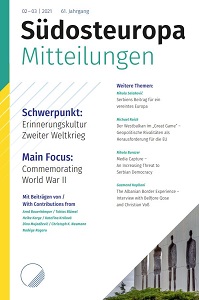Die Dominanz partikularer gegenüber universalistischen Narrativen –
The Dominance of Particularistic versus Universalistic Narratives –
Memories of World War II in Southeastern Europe in the European Context.
Author(s): Arnd BauerkämperSubject(s): WW II and following years (1940 - 1949)
Published by: Südosteuropa Gesellschaft e.V.
Keywords: Erinnerungskultur; Weltkrieg, Südosteuropa
Summary/Abstract: In the first two decades after 1945, memories of the Second World War in Western and Central Europe were framed in national categories. In the Communist dictatorships of Eastern and South-Eastern Europe, the political doctrine of “antifascism” predominated official remembrance. Nevertheless, particularistic memories that were geared to specific nations and ethnic groups persisted in small groups such as families. After the end of the Cold War and the collapse of the Communist regimes, these narratives resurfaced and fuelled myths about national heroism and ethnic pre-eminence, especially in South-Eastern Europe. The wars that led to the disintegration of Yugoslavia included particularly violent conflicts about memories. In the face of divisions between remembrances in Russia and the newly independent nation-states of East Central Europe a unified European memory culture is a chimera. By contrast, a self-reflective and empathic cross-border dialogue about different and even contrasting memories “from below” appears more promising. The concept of “travelling memory” complies with this political perspective and research vista.
Journal: Südosteuropa Mitteilungen
- Issue Year: 61/2021
- Issue No: 02-03
- Page Range: 49-60
- Page Count: 12
- Language: German
- Content File-PDF

